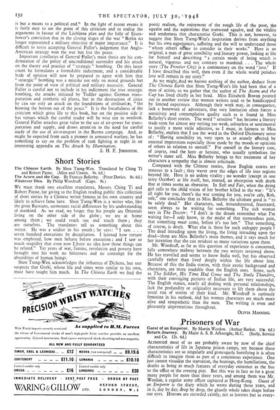Short Stories
WE must thank two excellent translators, Messrs. Ching Ti and Robert Payne, for giving to the English reading public this collection of short stories by a Chinese writer famous in his own country and likely to achieve fame here. Shen Tseng-Wen is a writer who, like the great Russians, surmounts racial differences by his understanding of mankind. As we read, we forget that his people are Orientals living on the other side of the globe ; we are at home among them ; we could reach out and touch them ; they are ourselves. The translators tell us something about this writer. He was a soldier in his youth ; he says: " I saw. . . . seven hundred executions by decapitation. I learned how torture was employed, how men behave before execution ; and I saw so much stupidity that even now Lhave no idea how those things can be related." Yet years of war, famine, revolution and poverty have brought into his work no bitterness and no contempt for the absurdities of human beings.
Shen Tseng-Wen acknowledges the influence of Dickens, but one suspects that Gorki, whose life and times were similar to his own, must have taught him much. In The Chinese Earth we find the
poetic realism, the enjoyment of the rough life of the poor, the squalor and the aspirations that transcend squalor, and the vitality and tenderness that characterise Gorki. This is not, however, to suggest that Shen Tseng-Wen's inspiration derives from anything but his own eipedences, suffering and the will to understand those "whom others reuse to consider in their works." Here is an original, a man of great sensibility and literary power, looking at life for himself and describing " a certain mode of being which is natural, vigorous and not contrary to mankind. . . . The whole story (The Frontier City) is a commentary on the word 'love.' If I have described this well, then even if the whole world perishes love will remain in my story."
As we tnight,tad we known nothing of the author, deduce from The Chinese Earth that Shen Tseng-Wen's life had been that of a man of action, so we gather that the author of The Acorn and the Cup has lived chiefly in her head. Miss Elizabeth Bowen pointed out in another review that women writers tend to be handicapped by limited experience. Although their work may, in consequence, lack a bonework of adventure, that very limitation often forces a sensitivity and contemplative quality such as is found in Miss Bellerby's short stories. The word " sensitive " has become a literary trade term for almost any writing too weak, colourless or sentimental to justify a more virile adjective, so I must, in fairness to Miss Bellerby, explain that I use the word in the Oxford Dictionary sense of : " Having sensibility to, very open to or acutely affected by external impressions especially those made by the moods or opinions of others in relation to oneself." For oneself in the literary case, of course, read the hero or heroine, who usually symbolises the writer's inner self. Miss Bellerby brings to -her treatment of her characters a sympathy that is almost solicitude.
Compared with the Chinese stories, these English stories are tenuous to a fault ; they waver over the edges of life into regions beyond life. Here is no ardent vitality ; no wonder (except in one story October) at life itself, but, instead, an absorption with death that at times seems an obsession. In Soft and Fair, when the dying girl calls to the child vision of her brother killed in the war : "It's all right for you, there's the war coming for you, you're safe, Rob, safe," one concludes that to Miss Bellerby the ultimate good is " to be safely dead." Her characters, sad, misunderstood, frustrated, seem always to be waiting for something. The sick woman says in The Doctor: "I don't in the dream remember what I'm waiting for—I only know, in the midst of that tremendous pain, that something must come, before it's too late." That something, of course, is death. What else is there for such unhappy people ? The dead intruding upon the living, the living intruding upon the dead—these are Miss Bellerby's main themes, and it says much for her invention that she can produce so many variations upon them. Mr. Woodruff, as far as this question of experience is concerned, falls somewhere midway between the two writers reviewed above. He has travelled .and seems to know India well, but has observed carefully rather than lived deeply within the life about him. Because of this the India stories, with their exotic background and characters, are more readable than the English ones. Some, such as The Soldier, His Time Had Come and The Simla Thunders, with their convincing pictures of Indian life, are very successful. The English stories, nearly all dealing with personal relationships, lack the profundity or originality necessary to lift them above the usual run of stories of their kind.. Mr. Woodruff is curiously feminine in his outlook, and his women characters are much more alive and sympathetic than the men. The writing is even and pleasantly unpretentious throughout.
OLIVIA MANNING.


































 Previous page
Previous page